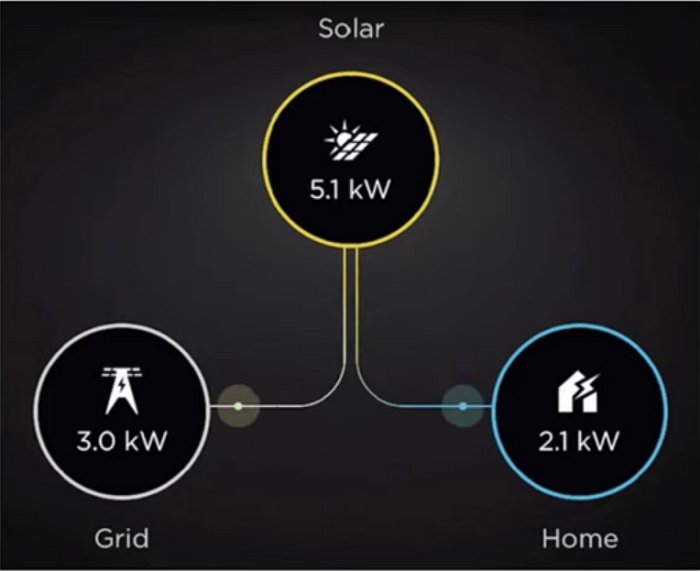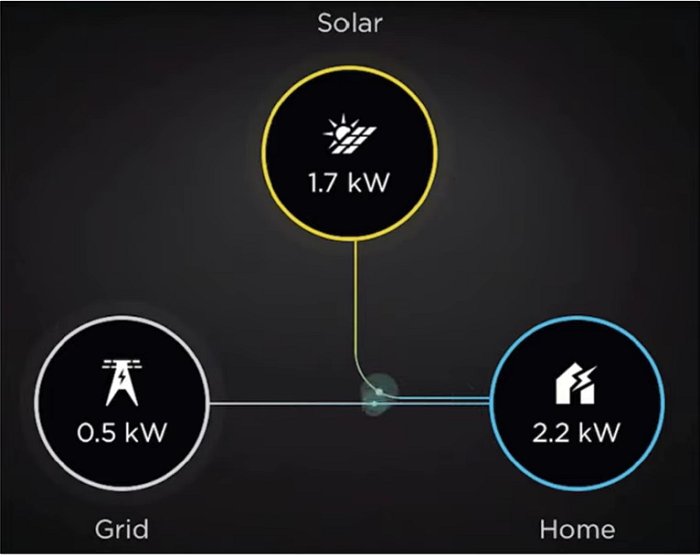In this video Finn explains the basics of how solar electricity is used in a home and what happens when there’s a surplus or deficit in power production.
Let’s say you have a 6kW solar system installed on your rooftop. It’s in the morning and the system is producing four kilowatts of power at that moment in time. What are the chances that your house needs exactly four kilowatts of power at that point? It’s about zero. When you have a grid connected solar system on your home, it will be operating in one of two modes.
- Number one, there’s too much solar electricity being generated.
- Number two, there’s not enough.
Let’s look at what happens in each of these situations.
Scenario One – Surplus Solar Power
The image below is taken from Finn’s Tesla solar monitoring system. In this scenario, there’s “too much” solar power – the system is producing just over five kilowatts of power (the yellow circle), but at that point in time Finn’s household is using about two kilowatts (the blue circle). So, we have around three kilowatts of excess solar power being generated.
The levels go up and down depending on how much electricity is being consumed in the house or if the sun goes behind clouds. But whenever there is surplus electricity being generated, it simply goes straight into the mains grid (white circle) in real-time where it will be available for use by other households. There’s often a payment made to the PV system owner for exporting this surplus called a feed-in tariff.
Scenario Two – Solar Electricity Deficit
The image below is taken from late in the day in Finn’s house, when the sun is close to setting.
Finn’s system is only producing around 1.7 kilowatts of power, but the household is using approximately 2.2 kilowatts. So, in that situation the mains grid “tops up” that solar supply in real time to give his house what it needs – and this is the electricity that Finn is paying for.
All this happens automatically without any intervention required.
If you’re considering installing panels or would like to understand more about solar energy, check out Finn’s book – The Good Solar Guide – the online version of which is free to read in its entirety. The book clearly explains the solar buying process in Australia; showing you what you’ll need, what to avoid, how to find a great installer and how to determine if installing panels will be beneficial to you.



 RSS - Posts
RSS - Posts



So what happens at the coal powered electricity station when someone adds some solar power? Do they immediately start burning less coal? No, I didn’t think so. So the only gain here for people’s a lower electricity bill. This does nothing to help stabilise climate change at its present level. Am I correct or am I missing something?
Tell me, why don’t these people go off grid? Why don’t they just use solar power & not have to pay any more electricity bills at all? I just don’t get it, it makes no sense to me to be using solar power & coal power at the same time.
Keith H. Burgess.
Yes. If we are assuming all else is remaining the same, when solar power is added to the grid coal power stations will burn less coal. Grid power is a “just in time” system and responds to electricity demand. Demand changes through the day regardless of whether or not there is solar or wind capacity and the grid has to respond.
I think it’s a shame when people go off-grid for no good reason because it means their surplus electricity won’t be sent into the grid and reduce fossil fuel use. This is bad for people with asthma, it’s bad for the climate.
Keith,
What do they do when they are off grid and the sun goes down mate?
Cheers
*I-need-solar*